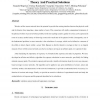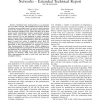124 search results - page 17 / 25 » Distributed Minimal Time Convergecast Scheduling in Wireless... |
SASN
2006
ACM
14 years 1 months ago
2006
ACM
Wireless sensor networks are typically deployed to measure the information field, rather than create an information field. However, by utilizing the radio on sensor nodes, it is...
WINET
2002
13 years 7 months ago
2002
Wireless ad-hoc sensor networks have the potential to provide the missing interface between the physical world and the Internet, thus impacting a large number of users. This conne...
INFOCOM
2008
IEEE
14 years 1 months ago
2008
IEEE
Abstract—Motivated by the increasing usage of wireless broadcast networks for multicast real-time applications like video, this paper considers a canonical real-time multicast sc...
INFOCOM
2006
IEEE
14 years 1 months ago
2006
IEEE
— Distributed time synchronization is an important part of a sensor network where sensing and actuation must be coordinated across multiple nodes. Several time synchronization pr...
WICON
2008
13 years 8 months ago
2008
In a tree-based ZigBee network, ZigBee routers (ZRs) must schedule their beacon transmission times to avoid beacon collisions. The beacon schedule determines packet delivery laten...


